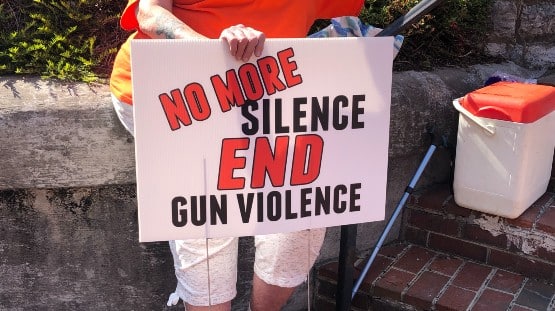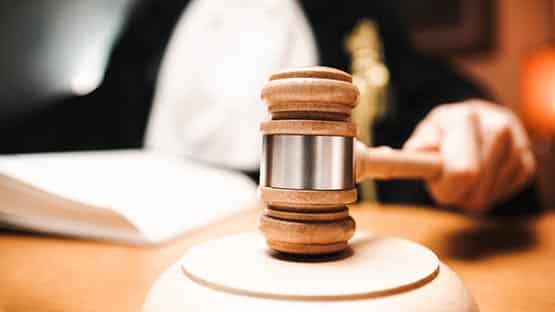
Augusta County Circuit Court Judge W. Chapman Goodwin has issued a court order prohibiting the placement of protest signs on the Augusta County Courthouse grounds that appears to be aimed at two local activists who protest at the downtown Staunton courthouse in support of gun-control legislation most weekday afternoons.
“It having come to the attention of the Court in recent weeks, that several individuals have placed or attempted to place signs on the grass located in front of the courthouse,” Goodwin wrote in the court order, which is dated May 9, “and it further having been the historical policy of the Court not to allow placement signage on the courthouse or courthouse grounds, it is hereby ORDERED and ADJUDGED that no signs shall be erected on the grounds of the Courthouse or placed on the courthouse building or its columns. This order shall be in keeping with historical precedent and shall insure the orderly administration of justice and maintain the impartiality of the Court.”
The date for the court order, maybe coincidentally, maybe not, is one day before the publication of an Augusta Free Press report on a previous effort by Steve Landes, the clerk of the Augusta County Circuit Court, to direct the two local activists, Linda Shallash and David Copper, to ask the county for permission to place their signs.
Shallash and Copper had understood Landes to be telling them that they needed a permit to be able to protest.
Landes, in an email to AFP, said he asks groups “to give the County the heads up regarding a protest at the Government Center or the Courthouse. The protestors may have misunderstood, but that is what we tell anyone asking, so that the County has a heads up.”
That May 10 report detailed how Assistant County Attorney Kathleen Keffer had indicated, in response to a Freedom of Information Act request from former Staunton City Council member Brenda Mead filed on behalf of the activists, that there are no “rules, policies or ordinances that directly address protests on County property.”
Shallash, from our reporting on that first story on the topic, had said that she had been told by Landes on April 19 that she and Copper “had to take our signs down from the grass in front of the Courthouse because we were standing in front on the street, and there was nobody on the grass with the signs.”
“He said we needed a permit. Even though we were only a few feet away,” Shallash said. “We were protesting guns. My sign said, ‘No More Silence End Gun Violence.’ He said because they were political. He said there were complaints, and if we didn’t take them down, then he would take them down, and bring them inside the Courthouse, then throw them out.”
That was back in April. Shallash said last week, on June 7, that Landes handed her and Copper a copy of Chapman’s May 9 court order and told them that “if we didn’t stop, the judge could make us go to court to show just cause,” that “we couldn’t put them in the ground even if we were standing next to them, we could hold them,” and that Landes “threatened us also saying that the sheriff’s deputies might come out to talk to us, so don’t be surprised if they do.”
We reached out to Landes, who was has served as the clerk of the Augusta County Circuit Court, which in Virginia is an elected position, since 2019, and to Katie Eastep, Goodwin’s judicial assistant, to get perspective on the court order, its enforcement, and how the judge can unilaterally set restrictions on free speech that would seem, at first glance, to run afoul of First Amendment protections.
Eastep has not responded to a request for comment on behalf of Goodwin.
Landes did respond, stressing that he has no authority to issue or enforce a court order, and that in his communications with Shallash and Copper, “I was simply trying to inform the individuals protesting about the court’s order and policy. My role was simply to act as a messenger as a courtesy, which my office does for any court order or policy.”
“As I noted to the individuals protesting, it has been a longstanding practice by the Court and Augusta County to not allow signs to be placed in the lawn of the Augusta County Circuit Courthouse,” Landes said. “In the past when signs have been placed on the Augusta County Circuit Courthouse lawn, they have been removed, and I would note that is the same practice at the Augusta County Government Center. In the past, although that was the practice at the Courthouse, there was not a written policy. For the Augusta County Circuit Courthouse, the attached court order now provides a written court policy.”
Landes emphasized that “no threat was made” to Shallash and Copper.
“I did note that Augusta County sheriff’s deputies could enforce the court order, as they do any court order, if requested by the judge,” Landes said. “To further clarify, I did state that my understanding of the court order, protestors could hold signs, but just not place them in the law and leave them. Orders issued by the judge regarding the Augusta County Circuit Courthouse maintain the security and decorum of the Court and provide for the safety and fairness of the proceedings for all.”










